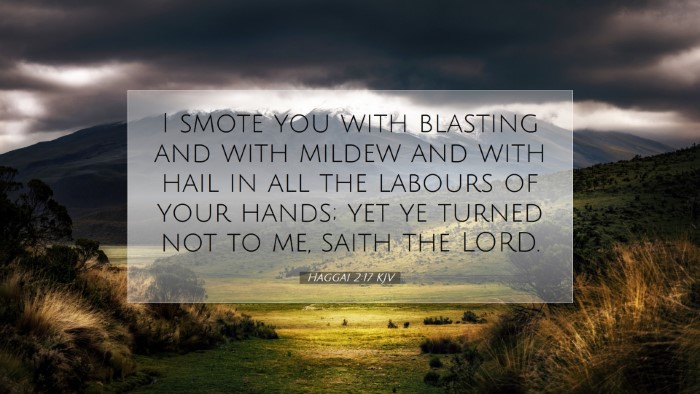Old Testament
Genesis Exodus Leviticus Numbers Deuteronomy Joshua Judges Ruth 1 Samuel 2 Samuel 1 Kings 2 Kings 1 Chronicles 2 Chronicles Ezra Nehemiah Esther Job Psalms Proverbs Ecclesiastes Song of Solomon Isaiah Jeremiah Lamentations Ezekiel Daniel Hosea Joel Amos Obadiah Jonah Micah Nahum Habakkuk Zephaniah Haggai Zechariah MalachiHaggai 2:17
Haggai 2:17 KJV
I smote you with blasting and with mildew and with hail in all the labours of your hands; yet ye turned not to me, saith the LORD.
Haggai 2:17 Bible Commentary
Commentary on Haggai 2:17
Verse: "I smote you with blasting and with mildew and with hail in all the labours of your hands; yet ye turned not to me, saith the Lord." (Haggai 2:17)
The verse presents a powerful message of divine accountability and the urgent call to repentance. In exploring its implications, the insights from notable public domain commentaries reveal both the historical context and the theological significance.
Contextual Background
Haggai was a prophet during the time of the post-exilic period, following the return of the Israelites from Babylonian captivity. This period was marked by challenges in rebuilding the Temple and re-establishing the identity of the Jewish people. Haggai's ministry is focused on urging the people to prioritize the rebuilding of the Temple, which had profound implications for their communal and spiritual life.
Theological Insights
As we delve into the verse, we observe the consequences of spiritual negligence. The Lord, through Haggai, recounts the afflictions He sent upon the people, visualized as "blasting," "mildew," and "hail." These metaphors illustrate the comprehensive nature of God's discipline over their agricultural endeavors, which were central to their livelihoods.
Matthew Henry's Commentary
According to Matthew Henry, the various calamities listed serve as a reminder of God’s sovereignty and His role as a caretaker of the covenant relationship with Israel. He emphasizes that God's chastisements were not merely punitive; rather, they were intended to awaken the people to a deeper awareness of their spiritual condition. Henry articulates that the merciful purpose behind the inflicted woes was to lead them back to the Lord—a call to reflect upon their priorities.
Albert Barnes's Perspective
Albert Barnes further elaborates that the phrase "yet ye turned not to me" signals a profound spiritual apathy. Despite experiencing divine discipline, the people did not recognize God’s hand in their hardships. Barnes highlights the biblical theme that covenant disobedience brings about calamity, but also how fundamentally the Lord desires His people to return to Him. This illustrates the ongoing theme of divine mercy coupled with judgment throughout Scripture.
Adam Clarke's Analysis
Adam Clarke offers a nuanced theological examination of the specific afflictions mentioned. He notes that "blasting" refers to destructive winds, "mildew" signifies decay due to dampness, and "hail" indicates severe weather conditions that ruin crops. Clarke relates these calamities to the people's failure to put God first in their lives. He asserts that neglecting one’s spiritual duties leads to wider societal disruption, hence the call to realign their focus toward God and the Temple rebuild.
Lessons for Modern Believers
The verse carries timeless truths that transcend its historical context, speaking directly to the hearts of modern believers, pastors, and theologians. Here are several applicable lessons:
- God's Discipline: The account serves as an important reminder that God disciplines those whom He loves. The intention behind hardship is not punishment for its own sake but rather a call to repentance and restoration.
- Recognition of God's Sovereignty: Believers are urged to acknowledge God's hand in both prosperity and adversity, understanding that their circumstances may carry profound spiritual lessons.
- The Importance of Prioritizing God: Haggai's emphasis on rebuilding the Temple speaks to the necessity of putting God first in all aspects of life, especially amid the distractions of daily living.
- Call to Repentance: Just as the Israelites were called to return to the Lord, contemporary believers face the ongoing invitation to examine their paths and align them with God's desires.
Conclusion
In summary, Haggai 2:17 encapsulates a profound theological dialogue between God and His people, rich with implications for both the ancient Israelites and today's church. It implores a communal introspection about priorities centered on God's will, challenging believers to be responsive to His voice amidst life's uncertainties. By weaving together perspectives from Matthew Henry, Albert Barnes, and Adam Clarke, we find a comprehensive understanding of the text that is both illuminating and instructive.


